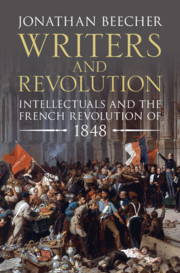11 - Aftermath
Themes and Conclusion
Published online by Cambridge University Press: 11 March 2021
Summary
After a general discussion of the experience of proscription, exile, and “internal exile,” we follow each of our nine writers into exile, retirement, or a new life. We then compare their assessments of particular events and individuals: notably the prison massacres during the June Days and the portraits of Auguste Blanqui and Adolphe Thiers. We turn to three themes: 1) the religiosity that pervaded the language of the ‘forty-eighters; 2) the repeated recourse to theatrical language and imagery to describe both the course of events and the tendency of revolutionaries to mimic the words, deeds and gestures of the first French revolutionaries; 3)the cult of “the people” elaborated as a source of democratic legitimacy by some of our writers and criticized by others. In conclusion, I maintain that in their effort to explain the failure of the democratic republic in 1848–1852, our writers raise questions that continue to concern us. Their central concern was the problem of democracy. When, and how, would the people be able to govern themselves? How was it that in the space of two generations democratic revolutions had twice culminated in Napoleonic dictatorship? There are worse questions to ask if we are to begin to understand the failures of democratic politics in our own time.
Keywords
- Type
- Chapter
- Information
- Writers and RevolutionIntellectuals and the French Revolution of 1848, pp. 405 - 451Publisher: Cambridge University PressPrint publication year: 2021



